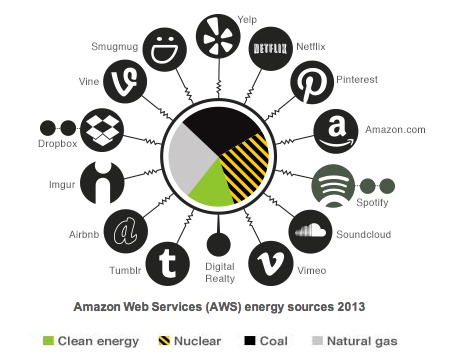In the latest effort to satisfy our desire to save every photo, thought, and fragment of information in cyberspace, Amazon plans to build a fat new server farm that will offer “cloud” storage for such companies as Yelp, Netflix, Pinterest, Dropbox, Spotify, Soundcloud, Tumblr, and Vine, to name more than a few.
According to the Seattle Times, the $1.1 billion server farm will be located in Dublin, Ohio. The city is served by an electric utility that gets two-thirds of its juice from coal-fired power plants, and has a history of lobbying for the coal industry.
As a Greenpeace report from earlier this year shows, not all energy-hogging data centers warm the climate equally, and Amazon’s are among the worst of the worst. Fossil fuel burning provides over half the energy used by Amazon’s colossal digital network — and nuclear power supplies another quarter. Here’s the breakdown:
By contrast, the Greenpeace report raves that Apple powers the iCloud with 100 percent renewables; Facebook put a data center in Iowa to spark the world’s largest purchase of wind turbines; and Google is signing long-term contracts to buy cleaner power for some of its centers. What’s more, these three web giants teamed up in North Carolina to pressure Duke Energy, the largest U.S. utility and one of the country’s biggest emitters, to offer customers — including their data warehouses — the choice to buy greener electricity.
(Before heaping too much praise on all that progress, recall that these companies and their founders don’t have perfect track records when it comes to caring for the climate.)
To avoid adding to Amazon’s dirty energy use (and supporting its labor-abusing, writer-exploiting, bookstore-bullying, and publisher-extorting ways) we can host our websites and store our digital stuff elsewhere until the company cleans up its act — and maybe even shop in a real store like back in the old days.
Yet given Amazon’s dominion over many of the apps and sites we use for fun, entertainment, information, and procrastination, we’d basically have to give up our computers and all other devices to steer clear of its sovereign realm.
If all the less desirable impacts of the internet were as palpable as the gratification we get from instantly streaming the last five Parks and Recreation episodes (made possible by Amazon’s web infrastructure), it would be a lot easier to make an informed decision about how much digital property we really want.
Maybe we need an app that’ll kick a cloud of smoke out of the back of our laptops every time we order a bag of groceries from Amazon Fresh.




